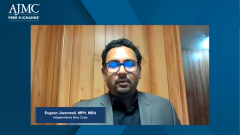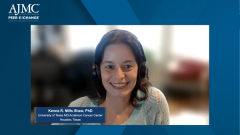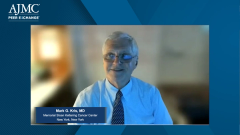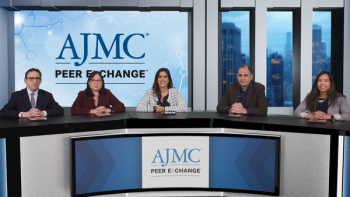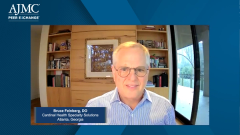
Comprehensive Genomic Profiling in Community Oncology
Recommendations to address limitations in more widespread use of reflex testing in community oncology.
Episodes in this series

Bruce Feinberg, DO: Kenna, when will every pathology lab and every hospital have a tabletop Illumina analyzer, or a competitor, and let the pathology departments just run these on their own? How close do you think we are to it going from the big labs, and this becoming in the way that in my oncology practice, I did my own CBCs. They weren't getting sent out, I was getting them in real time. We eventually did our own chemistries, but I feel like are we on the cusp of moving into an environment where availability will be such. And along with it the price coming down, but the current logistics issues are significant, especially if you can run the samples off blood and just do liquid.
Kenna R. Mills Shaw, PhD: From my perspective, I think that the technology is changing the panels, whether we like it or not. The panels are changing, and we will be adding that… so those do have to be dealt with over time and it must be dynamic enough. Getting an assay to be CLIA [Clinical Laboratory Improvement Amendments] certified is a significant enough challenge that I think it makes sense to continue to have CLIA sequencing be essentially a commodity that either a specialty lab does or a send-out lab does.
I do believe that desktop sequencing from a research perspective is doable. I think if I wanted to run a research sample on my MiSeq tomorrow, I could do so, but whether that's going to be something that we would consider clinically CLIA actionable, is a different answer. I do think that CLIA sequencing will continue to be something that will be a bit more niche market as we continue to have to change these assays. Because every time you add a biomarker, every time you change it even a little bit, you're going to have to revalidate and have that same level of consistency. And that's not something that's truly achievable from an overhead and logistics perspective for any group.
Bruce Feinberg, DO: Thanks. Mark, you get the last word. And it's a little bit off from the thematic element here but stealing from Twain based on the growth of precision medicine, the availability and the growth of genomic profiling. Is the statement fair to say that the demise of chemotherapy is overexaggerated, or it's a reality in the next decade?
Mark G. Kris, MD: Absolutely overexaggerated. Every patient with a target, gets chemotherapy. Every patient that gets a checkpoint inhibitor likely gets it with chemotherapy, at some point in their illness. Everybody gets chemotherapy, despite the ads from some of our pharmaceutical companies. But if I could just make a comment about NGS [next-generation sequencing], though. First, please don't underestimate the blood. I will say that I do not see a patient now referred by a community oncologist that has not had a ctDNA [circulating tumor DNA] test from blood. I don't see them. Eugean, I don't know how they're getting them paid for. I see no pattern that Medicare versus not Medicare or Fidelity vs Empire.
Bruce Feinberg, DO: Eugean, you have to save the response because we're out of time.
Eugean Jiwanmall, MPH, MBA: Liquid biopsy is depending on the test is covered. I will just say that especially in the non–small lung cancer world.
Mark G. Kris, MD: NGS gives you diagnostic acumen, the whole pattern of genomic alterations. It gives you tumor mutation burden. It gives you a microsatellite instability. Using the algorithms with the panels that we have, you can do primary site prediction. Using algorithms within the data we have in these 500-gene panels, you can do prognostic information all from that one test. And the more that people see everything that's going to happen from that 1 test, how each of those pieces of information can be useful for a patient, the more this will become standard of care. And I think that's what's going to happen, more and more people are going to see the power of this. And it's the multiplex power of it that makes it so useful.
Bruce Feinberg, DO: That's a great last word. I want to thank the panelists, great information, great dialogue. There was a point in time I could have just left and you would have been fine without me here, and that's when it really is clicking. Eugean, Mark, Kenna, just an absolute pleasure. Thank you again to our viewing audience. We hope you found this AJMC® Peer Exchange discussion to be useful and informative. Bye-bye.
Mark G. Kris, MD: Bye-bye. Thank you. Thank you all.
Transcript edited for clarity.
Newsletter
Stay ahead of policy, cost, and value—subscribe to AJMC for expert insights at the intersection of clinical care and health economics.
